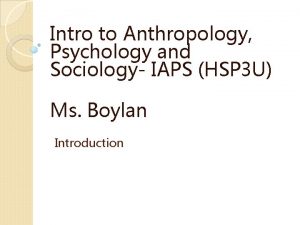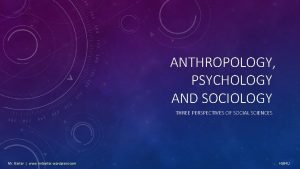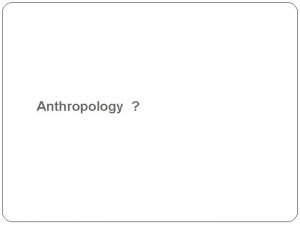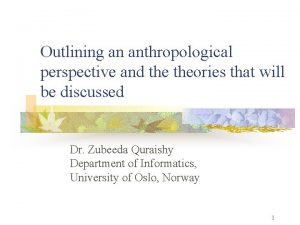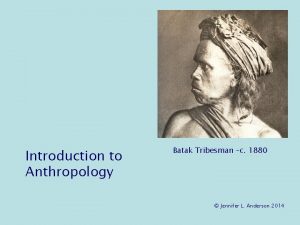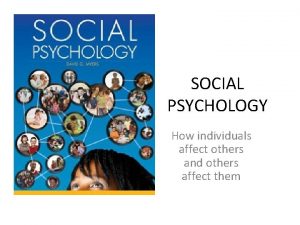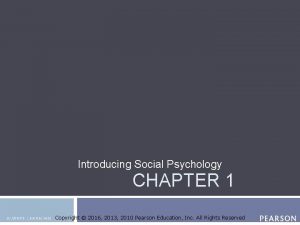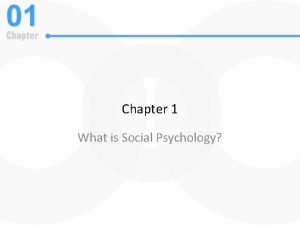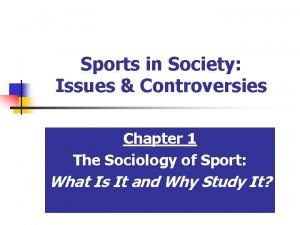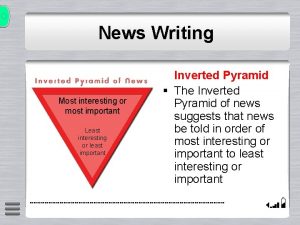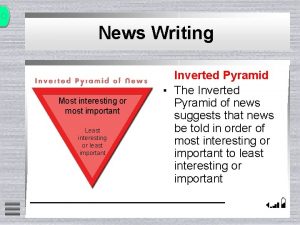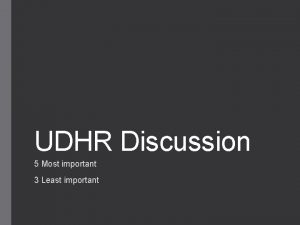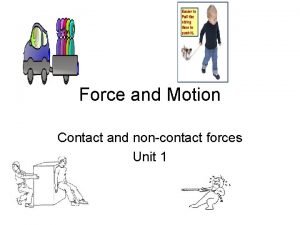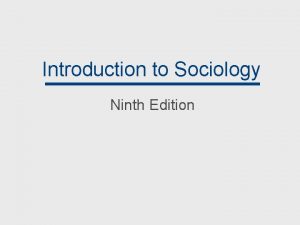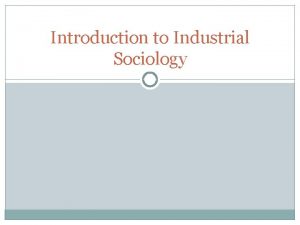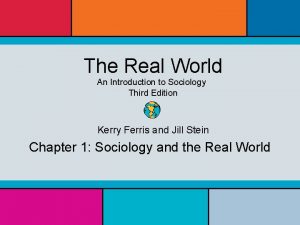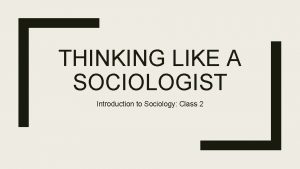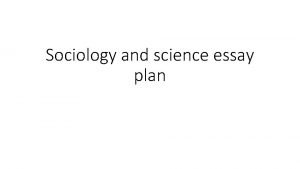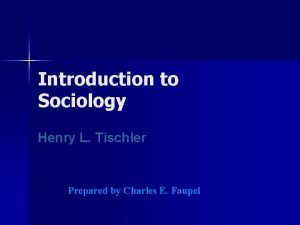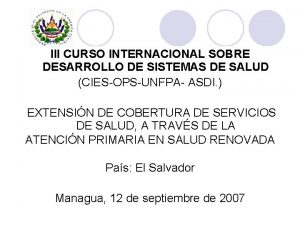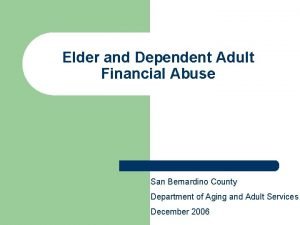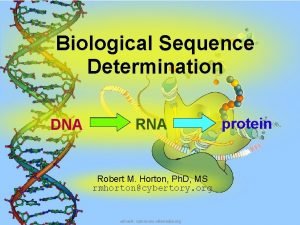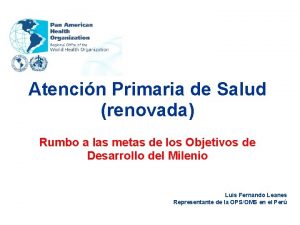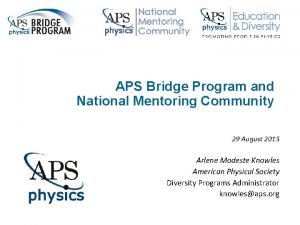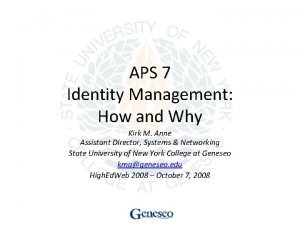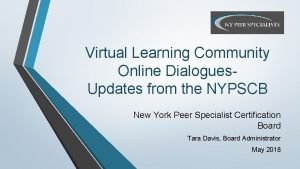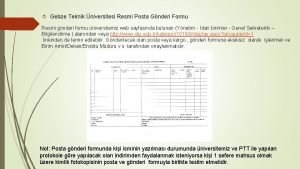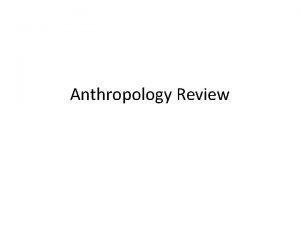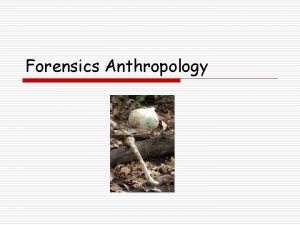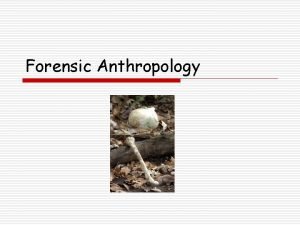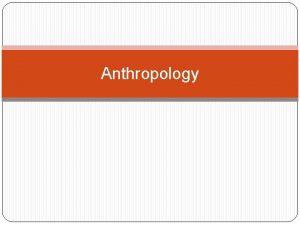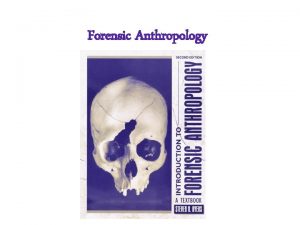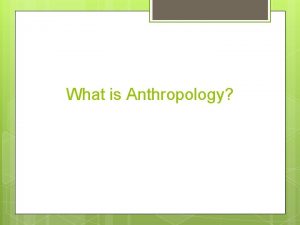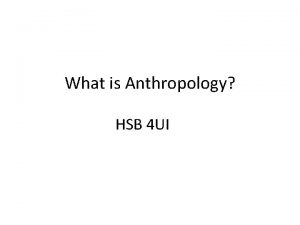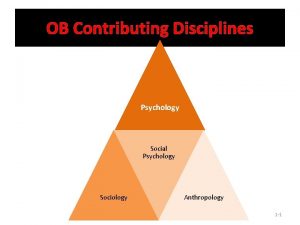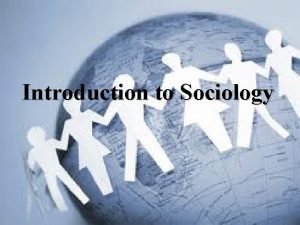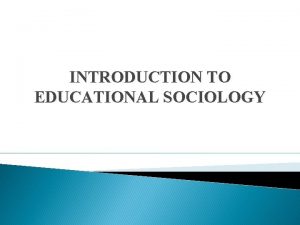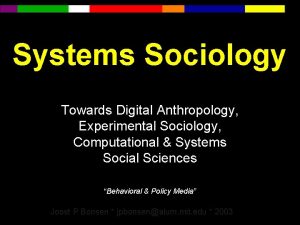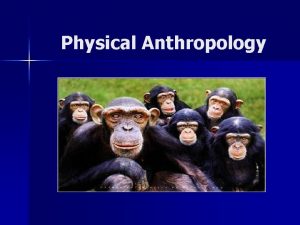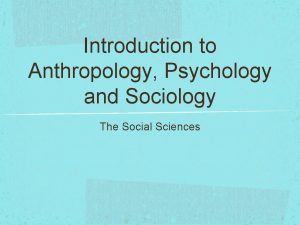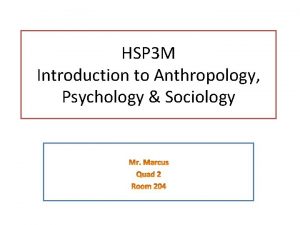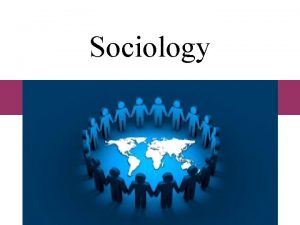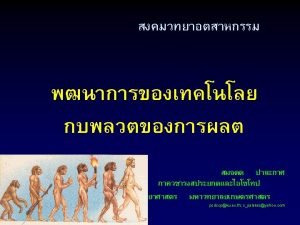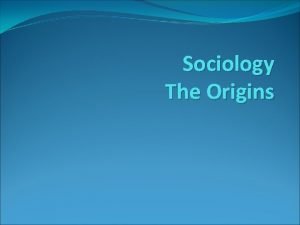Introduction to Anthropology Psychology Sociology APS Some important


























































- Slides: 58

Introduction to Anthropology, Psychology, Sociology (APS)

Some important information before we get started: My website: www. norrismalvern. weebly. com My email: laura. norris@tdsb. on. ca Spelling and grammar are very important to me!

Brain storm, what is Anthro, Psych, Soc?

Definition Social science is, in its broadest sense, the study of society and the manner in which people behave and influence the world around us. It tells us about the world beyond our immediate experience, and can help explain how our own society works - from the causes of unemployment or what helps economic growth, to how and why people vote, or what makes people happy. It provides vital information for governments and policymakers, local authorities, non-governmental organisations and others.

Social Science overview, animated 4 mins https: //www. youtube. com/watch? v=DSIda. TSG 2 Gg

Why Study Social Science? What can it teach us? We study social science because social phenomena affect people’s lives in profound ways. Think about this list and how the study of social science affects each of these things: Families, Schools, the Economy, Mass Media, Attitudes, Social Networks


Families. What makes families more or less successful? What makes marriages more successful? What makes them fail? What are the effects of divorce? Does it hurt the children of divorce? How much, in what ways, and for how long? A medical doctor can treat the effects of family dysfunction and divorce—say, with anti-depressants or therapy and so on—but we can learn and know more about how to prevent some of this dysfunction from doing social science.


Schools. What are effective means of educating children? What makes for good teachers? How can we measure and evaluate teaching and learning? How can we overcome inequalities in educational achievement created by socioeconomic status and other factors? The “hard” sciences and medicine might be able to help a bit here, but these too are mostly questions for social science.


The Economy The economy. Fundamentally, what makes them grow or shrink? Few things are as central to people’s quality of life as economic prosperity. Here again, there is synergy with, say, medicine: getting sick affects your ability to be economically productive. But doctors are not going to be shed much light on this question. Economists and other social scientists


Mass Media. The information conveyed through mass media—cultural, political, and otherwise— can profoundly influence how we understand the world. How is that information produced? What are the incentives and norms that govern media organizations? How does that information affect people? How does that information help or hurt people—for example, by dismantling or reinforcing stereotypes, or by mitigating or fomenting outright violence? Social scientists spend a lot of time trying to figure this out.


Attitudes. Why do people develop particular attitudes about social and political phenomena? How does those attitudes affect subsequent behavior? Whether people like or dislike social groups, for example, has an impact on the quality of life for those groups. So we must understand the origins and evolution of attitudes like prejudice.


Social Networks Social networks. The networks which people are embedded—which encompass families and schools as well as other institutions—can affect many things about them. Whether they are healthy, whether they are prejudiced, whether they can survive natural disasters, and so on.

Anthropology What is Anthropology? The study of all aspects of human life and culture. Anthropology examines such topics as how people live, what they think, what they produce, and how they interact with their environments. Anthropologists try to understand the full range of human diversity as well as what all people share in common. Anthropologists ask such basic questions as: when, where, and how did humans evolve? How do people adapt to different environments? How have societies developed and changed from the ancient past to the present?

https: //www. youtube. com/watch? v=cmnoxm. VNW 2 Y What is Anthropology? (6 mins)

Psychology is the scientific study of behaviour and the mind. This definition contains three elements. The first is that psychology is a scientific enterprise that obtains knowledge through systematic and objective methods of observation and experimentation. Second is that psychologists study behaviour, which refers to any action or reaction that can be measured or observed- such as the blink if an eye, an increase in heart rate, or the unruly violence that often erupts in a mob. Third is that psychologists study the mind, which refers to both conscious and unconscious mental states. These states cannot be seen, only inferred from observable behaviour.

https: //www. youtube. com/watch? v=vo 4 p. MVb 0 R 6 M What is psychology video

Sociology is the scientific study of human social relations or group life. Socioloigists examine the ways in which social structures and institutions such as class, family, community and power and social problems such as crime and abuse, influence society. Social interaction, or the responses of individuals to each other, is perhaps the basic sociological concept, because such interaction is the elementary component of all relationships and groups that make up human society.

https: //www. youtube. com/watch? v=e 5 pp_f. ZDU 8 I What is Sociology video

Now that we understand the basics about Social Sciences, let’s put this knowledge to use. After watching the Documentary “Age of Anxiety”, we are going to think about how thinkers in each of the social sciences would view this topic. http: //www. cbc. ca/doczone/episodes/age-ofanxiety

Physical/Biological Anthropology

Definition: Physical anthropology, branch of anthropology concerned with the origin, evolution and diversity of people. Physical anthropologists focus on three main areas: - Human and non-human primate evolution - Human variation and it’s significance - Biological reasons that humans behave the way they do


Read answer questions from the package titled: Physical Anthropology

Charles Darwin

The theories of Charles Darwin are theories at the root of the study of Physical Anthropology. The ideas of Charles Darwin are considered by many to be the most important ideas in the history of mankind. His book ‘On the Origin of Species’ was written in 1859. It was quite controversial for many Christians at the time. There are still people (mainly religious) who continue to dispute evolution today.

Creationism in Texas http: //184. 154. 224. 5/~creatio 1/index. php? option=co m_content&task=view&id=23&Itemid=15 https: //whyevolutionistrue. wordpress. com/2014/01/2 8/teaching-creationism-is-widespread-in-u-s-publicschools/

Raymond Dart

In 1924 Raymond Dart found some rocks blasted from a limestone quarry in Taung, a small town situated in the North West Province of South Africa. Among them he found a skull, obviously that of a primate. After more than a month of chipping the skull out of the rock, he discovered that it was something much more interesting than a simple primate. It turned out to be the first specimen of an Australopithecus Africanus. He argued that this skull represented the missing link between apes and humans since it had humanlike teeth and an upright posture.

https: //www. youtube. com/watch? v=Jw-c. WZJGokw Raymond Dart- start at 9: 16

Louis and Mary Leakey

The notion of an African genesis for humankind is widely accepted today, but it was not always so. When Louis Leakey began to search for human fossils in East Africa in the early 1930 s he was met with skepticism from his colleagues. Louis and his wife Mary held firm to this belief through decades of exploring sites in Tanzania and Kenya, and in 1959 their faith was vindicated when they uncovered the first of many hominid fossils at Olduvai Gorge.

Donald Johanson and Lucy

During a survey at Hadar Ethipoia in 1974, Johanson and his team observed a hominid forearm jutting from the bank of a gully. They noticed that the forearm and other remains nearby appeared to be from the same individual. When the excavation was finished, they had found more than 40 percent of a skeleton. The specimen, named Lucy, was dated to 3. 2 million years ago. It was classified in 1978 as the first known member of A. afarensis, as species thought to be one of the direct ancestors of modern




The Human Animal We are going to watch the documentary “The Human Animal: The Hunting Ape” https: //www. youtube. com/watch? v=Aa. Z 9 y. P 4 m 1 z 0

Computer Lab Complete evolution assignment in the computer lab, hand in for completion marks

The future of human Evolution







http: //ngm. nationalgeographic. com/2013/10/chan ging-faces/funderburg-text

TED Talk- neo-evolution https: //www. ted. com/talks/harvey_fi neberg_are_we_ready_for_neo_evo lution

How might humans change and evolve in the future? According to the National Geographic article; FUTURE HUMANS: Four Ways We May, or May Not, Evolve by James Owen, there are four major predictions presented by futurists. http: //news. nationalgeographic. com/new s/2009/11/091124 -origin-of-species-150 darwin-human-evolution. html

Prediction #1 Human Evolution Is Dead This theory argues that because humans are not isolated in smaller groups, it becomes much harder for genetic mutations and changes to be passed down through generations. These futurists believe that humans will become more and more alike as genes mix with larger and larger groups. They also believe that Darwin’s theories have lost their relevance, as medical advances have made it easier for people unable to adapt to live longer and to pass on their genes.

Prediction #2 Humans will continue to evolve Recent studies have been done to demonstrate that human evolution is in fact speeding up through sexual mate selection (ie. Traits needed to succeed economically and raise kids). Also, gene selection is making it more and more easy to choose specific traits for your child. We are therefore speeding up evolution ourselves. http: //www. fertility-docs. com

Prediction #3 Humans to Achieve Electronic Immortality The philosophy known as transhumanism sees humans taking charge of their evolution and changing their biological limitations via technology. In essence, the old-fashioned evolution of On the Origin of Species may be beside the point: The future may belong to unnatural selection.

Prediction #4 New Era of Evolution Awaits on Off-World Colonies? If, in the future, habitable planets beyond our solar system were colonized by Earth migrants, that could provide the necessary isolation for new human species to evolve. If you think about it, if a small group of people went on a one-way voyage to the Americas 14, 000 years ago, and then when new people Europeans showed up 500 years ago, they were still the same species but displayed different physical characteristics. This could happen if humans were isolated on another planet. What are some ways they could evolve? http: //www. mars-one. com
 Introduction to anthropology psychology and sociology
Introduction to anthropology psychology and sociology Venn diagram of anthropology sociology and psychology
Venn diagram of anthropology sociology and psychology Introduction to anthropology psychology and sociology
Introduction to anthropology psychology and sociology Anthropology vs sociology
Anthropology vs sociology Anthropological perspective examples
Anthropological perspective examples Introduction to anthropology
Introduction to anthropology Social psychology vs sociology
Social psychology vs sociology Sociology vs social psychology
Sociology vs social psychology Social psychology and common sense
Social psychology and common sense Sociology vs psychology
Sociology vs psychology Sociology vs psychology
Sociology vs psychology Example of a news story
Example of a news story Inverted pyramid in news writing
Inverted pyramid in news writing Least important to most important
Least important to most important For all pots p, there is a lid l such that
For all pots p, there is a lid l such that They say sometimes you win some
They say sometimes you win some They say sometimes you win some
They say sometimes you win some Ice cream countable or uncountable noun
Ice cream countable or uncountable noun Contact force
Contact force Some say the world will end in fire some say in ice
Some say the world will end in fire some say in ice Some say the world will end in fire some say in ice
Some say the world will end in fire some say in ice Some trust in chariots and some in horses song
Some trust in chariots and some in horses song Introduction to sociology 9th edition
Introduction to sociology 9th edition Define industrial sociology
Define industrial sociology The real world an introduction to sociology
The real world an introduction to sociology Introduction to sociology
Introduction to sociology Introduction to sociology essay
Introduction to sociology essay Tischler sociology
Tischler sociology Beneficios de un sistema de salud basado en aps
Beneficios de un sistema de salud basado en aps Aps sacramento
Aps sacramento Aps toimintahäiriö
Aps toimintahäiriö Aps renovada
Aps renovada Adult protective services san bernardino
Adult protective services san bernardino Carrera referencial lineal aps 2022
Carrera referencial lineal aps 2022 Pyrosequencing animation
Pyrosequencing animation Aps renovada
Aps renovada Aps and gps
Aps and gps Canvas.aps
Canvas.aps Aps bridge program
Aps bridge program Id management aps
Id management aps Gullistan carpet
Gullistan carpet Wv aps
Wv aps Aps integral
Aps integral Laporan evaluasi kinerja program studi
Laporan evaluasi kinerja program studi мякис
мякис Aps scm
Aps scm Aps hr professional stream
Aps hr professional stream Temple franklin
Temple franklin Aps status
Aps status Aps peer specialist
Aps peer specialist Scm express
Scm express Ejes del mais en salud
Ejes del mais en salud Rhel 6 to rhel 7 upgrade
Rhel 6 to rhel 7 upgrade Aps ring status
Aps ring status Aps
Aps Iadeli taahhütlü posta zarfı
Iadeli taahhütlü posta zarfı Aps supervisor training
Aps supervisor training Wikipedia aps
Wikipedia aps Aps
Aps
